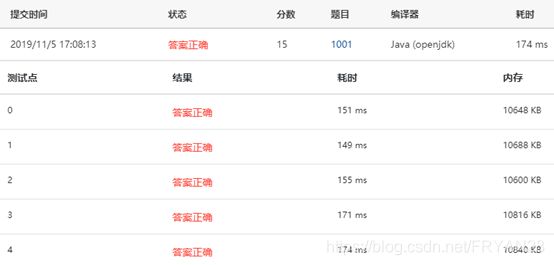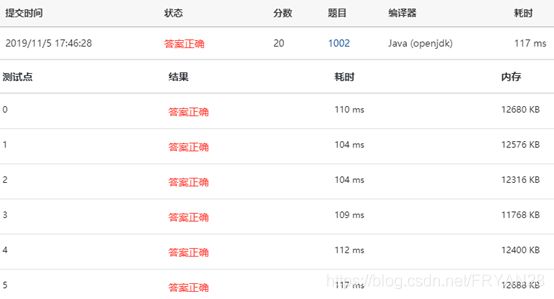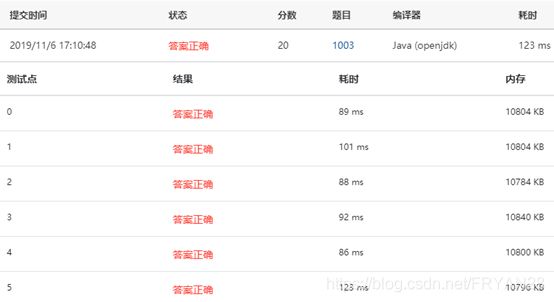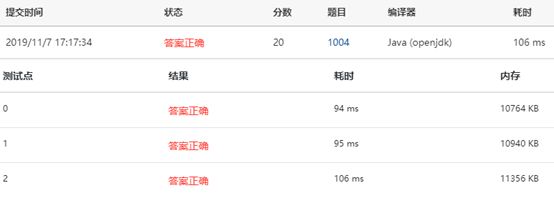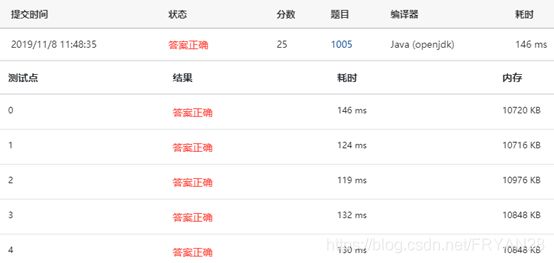【PAT】乙级JAVA实现,1001-1005题
1001 害死人不偿命的(3n+1)猜想
卡拉兹(Callatz)猜想:
对任何一个正整数 n,如果它是偶数,那么把它砍掉一半;如果它是奇数,那么把 (3n+1) 砍掉一半。这样一直反复砍下去,最后一定在某一步得到 n=1。卡拉兹在 1950 年的世界数学家大会上公布了这个猜想,传说当时耶鲁大学师生齐动员,拼命想证明这个貌似很傻很天真的命题,结果闹得学生们无心学业,一心只证 (3n+1),以至于有人说这是一个阴谋,卡拉兹是在蓄意延缓美国数学界教学与科研的进展……
我们今天的题目不是证明卡拉兹猜想,而是对给定的任一不超过 1000 的正整数 n,简单地数一下,需要多少步(砍几下)才能得到 n=1?
输入格式:
每个测试输入包含 1 个测试用例,即给出正整数 n 的值。
输出格式:
输出从 n 计算到 1 需要的步数。
输入样例:
3输出样例:
5
import java.util.Scanner;
public class Main {
public static void main(String arg[]){
Scanner scanner = new Scanner(System.in);
int number = scanner.nextInt();
scanner.close();
int count = 0;
if (number >0 && number <=1000){
while (number != 1){
if (number%2 == 0){
number = number/2;
}else {
number = (3*number +1)/2;
}
count++;
}
System.out.print(count);
}
}
}
1002 写出这个数
读入一个正整数 n,计算其各位数字之和,用汉语拼音写出和的每一位数字。
输入格式:
每个测试输入包含 1 个测试用例,即给出自然数 n 的值。这里保证 n 小于 10100。
输出格式:
在一行内输出 n 的各位数字之和的每一位,拼音数字间有 1 空格,但一行中最后一个拼音数字后没有空格。
输入样例:
1234567890987654321123456789输出样例:
yi san wuimport java.math.BigDecimal;
import java.util.Scanner;
public class Main {
public static void main(String arg[]){
String number[] = {"ling","yi","er","san","si","wu","liu","qi","ba","jiu"};
Scanner scanner = new Scanner(System.in);
BigDecimal n = scanner.nextBigDecimal();
scanner.close();
String s = String.valueOf(n);
char[] nChar = s.toCharArray();
int[] nList = new int[nChar.length];
int sum = 0;
for (int i = 0; i < nChar.length; i++) {
nList[i] = Integer.parseInt(nChar[i]+"");
sum = sum + nList[i];
}
char[] sumChar=(String.valueOf(sum)).toCharArray();
for(int j=0; j
1003 我要通过!
“答案正确”是自动判题系统给出的最令人欢喜的回复。本题属于 PAT 的“答案正确”大派送 —— 只要读入的字符串满足下列条件,系统就输出“答案正确”,否则输出“答案错误”。
得到“答案正确”的条件是:
- 字符串中必须仅有
P、A、T这三种字符,不可以包含其它字符; - 任意形如
xPATx的字符串都可以获得“答案正确”,其中x或者是空字符串,或者是仅由字母A组成的字符串; - 如果
aPbTc是正确的,那么aPbATca也是正确的,其中a、b、c均或者是空字符串,或者是仅由字母A组成的字符串。
现在就请你为 PAT 写一个自动裁判程序,判定哪些字符串是可以获得“答案正确”的。
输入格式:
每个测试输入包含 1 个测试用例。第 1 行给出一个正整数 n (<10),是需要检测的字符串个数。接下来每个字符串占一行,字符串长度不超过 100,且不包含空格。
输出格式:
每个字符串的检测结果占一行,如果该字符串可以获得“答案正确”,则输出 YES,否则输出 NO。
输入样例:
8
PAT
PAAT
AAPATAA
AAPAATAAAA
xPATx
PT
Whatever
APAAATAA输出样例:
YES
YES
YES
YES
NO
NO
NO
NOimport java.util.Scanner;
public class Main {
public static void main(String arg[]){
Scanner in = new Scanner(System.in);
int n = in.nextInt();
in.nextLine();
for(int i = 0; i < n; i++){
String str = in.next();
if(onlyPAT(str)){
if(aPbTc(str)){
System.out.println("YES");
}else {
System.out.println("NO");
}
}else {
System.out.println("NO");
}
}
in.close();
}
public static boolean onlyPAT(String str){
for(int i = 0; i < str.length(); i++){
if (str.charAt(i) != 'P' && str.charAt(i) != 'A' && str.charAt(i) != 'T'){
return false;
}
}
return true;
}
public static boolean aPbTc(String str){
int a = str.indexOf("P");
int c = str.length() - str.indexOf("T") - 1;
int b = str.indexOf("T") - str.indexOf("P") - 1;
if((b == 0 ) || (a * b != c)){
return false;
}else {
return true;
}
}
}
1004 成绩排名
读入 n(>0)名学生的姓名、学号、成绩,分别输出成绩最高和成绩最低学生的姓名和学号。
输入格式:
每个测试输入包含 1 个测试用例,格式为
第 1 行:正整数 n
第 2 行:第 1 个学生的姓名 学号 成绩
第 3 行:第 2 个学生的姓名 学号 成绩
... ... ...
第 n+1 行:第 n 个学生的姓名 学号 成绩
其中姓名和学号均为不超过 10 个字符的字符串,成绩为 0 到 100 之间的一个整数,这里保证在一组测试用例中没有两个学生的成绩是相同的。
输出格式:
对每个测试用例输出 2 行,第 1 行是成绩最高学生的姓名和学号,第 2 行是成绩最低学生的姓名和学号,字符串间有 1 空格。
输入样例:
3Joe Math990112 89Mike CS991301 100Mary EE990830 95输出样例:
Mike CS991301Joe Math990112
import java.util.*;
public class Main {
public static void main(String arg[]){
Scanner in = new Scanner(System.in);
int n = in.nextInt();
in.nextLine();
ArrayList students = new ArrayList();
for (int i = 0; i < n; i++) {
String[] lineSplit = in.nextLine().split("\\s+");
students.add(new Student(lineSplit[0], lineSplit[1], Integer.parseInt(lineSplit[2])));
}
Collections.sort(students);
System.out.println(students.get(n-1));
System.out.println(students.get(0));
}
static class Student implements Comparable{
String name;
String stuId;
int score;
public Student(String name, String stuId, int score){
this.name = name;
this.stuId = stuId;
this.score = score;
}
public int compareTo(Student other){
return (this.score - other.score);
}
public String toString(){
return (this.name + " " + this.stuId);
}
}
}
1005 继续(3n+1)猜想
卡拉兹(Callatz)猜想已经在1001中给出了描述。在这个题目里,情况稍微有些复杂。
当我们验证卡拉兹猜想的时候,为了避免重复计算,可以记录下递推过程中遇到的每一个数。例如对 n=3 进行验证的时候,我们需要计算 3、5、8、4、2、1,则当我们对 n=5、8、4、2 进行验证的时候,就可以直接判定卡拉兹猜想的真伪,而不需要重复计算,因为这 4 个数已经在验证3的时候遇到过了,我们称 5、8、4、2 是被 3“覆盖”的数。我们称一个数列中的某个数 n 为“关键数”,如果 n 不能被数列中的其他数字所覆盖。
现在给定一系列待验证的数字,我们只需要验证其中的几个关键数,就可以不必再重复验证余下的数字。你的任务就是找出这些关键数字,并按从大到小的顺序输出它们。
输入格式:
每个测试输入包含 1 个测试用例,第 1 行给出一个正整数 K (<100),第 2 行给出 K 个互不相同的待验证的正整数 n (1<n≤100)的值,数字间用空格隔开。
输出格式:
每个测试用例的输出占一行,按从大到小的顺序输出关键数字。数字间用 1 个空格隔开,但一行中最后一个数字后没有空格。
输入样例:
63 5 6 7 8 11输出样例:
7 6import java.util.ArrayList;
import java.util.Collections;
import java.util.Scanner;
public class Main {
public static void main(String[] args) {
Scanner scanner = new Scanner(System.in);
int K = scanner.nextInt();
long[] numList = new long[K];
ArrayList arrayList = new ArrayList<>();
for (int i = 0; i < K; i++) {
numList[i] = scanner.nextLong();
int a = Integer.parseInt(String.valueOf(numList[i]));
arrayList.add(a);
}
for (int i = 0; i < arrayList.size(); i++) {
K = arrayList.size();
int a = arrayList.get(i);
threeN(a, arrayList);
if(K > arrayList.size()){
for (int j = 0; j < arrayList.size(); j++) {
threeN(arrayList.get(j), arrayList);
}
}
}
Collections.sort(arrayList);
for (int i = arrayList.size()-1; i >= 0; i--) {
if (i == arrayList.size()-1){
System.out.print(arrayList.get(i));
}else {
System.out.print(" " +arrayList.get(i));
}
}
}
public static void threeN(int i, ArrayList arrayList){
while (i != 1){
if (i%2 == 0){
i = i/2;
} else {
i = (3*i + 1)/2;
}
for (int j = 0; j < arrayList.size(); j++) {
if(arrayList.get(j) == i){
arrayList.remove(j);
}
}
}
}
}
